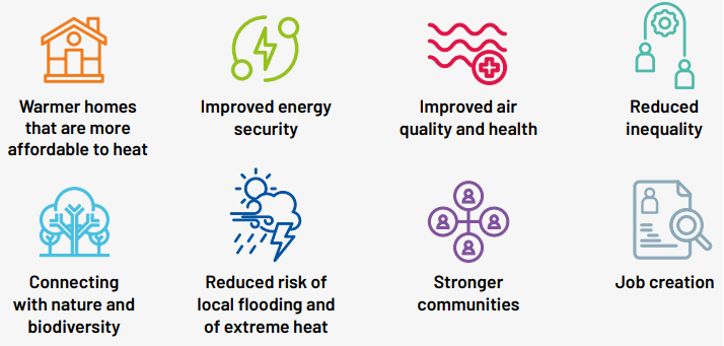Commentary
Neil Jennings and Pauline Paterson
8 November 2023
Recent announcements by the UK Government have disappointingly included a watering-down of a number of climate-related policies, such as weakening energy efficiency standards in the private-rented sector. This has been accompanied by a narrative that attempts to pitch ‘actions that are good for the climate’ as being in opposition to ‘actions that are good for people and the economy’. Not only does this appear to be a rather cynical attempt to use climate change and climate action to create political division, it’s also a false dichotomy.
Climate action isn’t just about avoiding the worst impacts of climate change in some distant future. It is about improving the lives of people in the here-and-now, by bringing with it a range of win-wins or co-benefits that help tackle a host of other issues that figure high on people’s day-to-day list of concerns – from the cost-of-living crisis, to security, health and housing. Our recently published research, funded by the Place-based Climate Action Network (PCAN), shows just how popular these co-benefits of climate action are with the UK public, and why they resonate.
What did we do?
We surveyed a nationally representative sample of the UK population (on the basis of age, gender and ethnicity) in May 2022 to understand how important they perceived eight different co-benefits of climate action to be (see box below for these co-benefits). We then conducted eight focus groups (Dec 2022 - Apr 2023) to further explore why particular co-benefits were perceived as being more important than others and why opinions varied between different groups of people.

What did we find?
All eight co-benefits were perceived as being very important or important by the majority of survey respondents. Warmer homes that are more affordable to heat, improved energy security, improved air quality and health, and reduced inequality were perceived as particularly important. When thinking about warmer homes that are more affordable to heat, 76% of survey respondents perceived this to be important/very important to themselves and this value was as high as 86% when people considered its importance to the UK as a whole. This particular co-benefit resonated because it tied in directly to the non-climate challenges people were facing, such as the struggle to keep their homes warm because of the poor insulation of their property and facing the choice between eating-and-heating.
"It's my firm belief... no one in this country, no one should have to choose between heating and eating and that would be my primary concern over anything, to be honest, because I think that's a social thing that as a country, we should be thoroughly ashamed that we've been brought to this."
65+ year old female, white, Greater London
How do opinions vary?
Female respondents perceived all eight co-benefits to be more important than male respondents. Opinions also varied on the basis of ethnicity, with people from ethnic minority backgrounds much more likely to perceive improved air quality and health to be important compared to white people, for example. We also found that people who experienced problems caused by not tackling climate change, such as living in a poorly insulated home or breathing unclean air, were much more likely to support climate action related to those issues.
As illustrated by the quote above, many of the co-benefits of climate action were things that people wanted to see more action on anyway and the fact that it could also benefit climate change was seen as an added bonus.
One particular focus group that stood out was with a Somali community group in West London. We asked participants to state which of the co-benefits was most important to them, and improved air quality and health was head-and-shoulders above the rest. When asked why this was so important to them, almost all participants shared their experience of them and their children living with asthma and eczema and other ailments caused by air pollution. In this case, attendees were united by their shared heritage but came from different geographical parts of the borough.
"You open the window. All the dust is coming and if you close, there's no air, so it's a big problem as well because you cook and you open it, if you live on the road and the cars are very bad. So, by the time you clean the house and there's a lot of dusting... And then most [of] the kids, they're asthmatic, they have thing on skin and bad situation. You go to GP, prescribe cream. You need to target the real problem... For me I think air pollution is really, in the UK at the moment, very bad."
45-54 year old female, African heritage, Greater London
We need to talk more about… climate action
Awareness of the co-benefits of climate action wasn’t particularly high amongst focus group participants, but when people became aware of the opportunities, they were very supportive.
When asked what came to mind when they thought of things that could be done to tackle climate change, people often mentioned relatively small actions, such as recycling. This mirrors findings from previous studies and poses a challenge. If people perceive the scale of climate action to only be small and incremental, why would they perceive that climate action can bring with it any significant benefits to their lives, such as helping them to breathe clean air or live in a home they can afford to heat?
Climate action can provide short-term, local benefits from actions that help to address the long-term, global challenge posed by climate change. But to bring these co-benefits into reality requires well-designed and equitable policies that make it as easy as possible for all sections of society to shift to lower-impact lifestyles.
As highlighted by the Climate Change Committee, the UK also requires “a coherent public engagement strategy on climate action”. Such a strategy can help to increase awareness of the many benefits that climate action can bring and help to counter disingenuous narratives that try to pitch climate action as being in conflict with poverty alleviation or the economy.
Organisations communicating with the public, such as local and national government, should weave information about these co-benefits into their communications on climate change to highlight the near-term, and often local benefits that reducing greenhouse gas emissions can bring to people’s lives around the country. Locally-driven action can help to move the dial on climate action by engaging the public and creating a greener, cleaner, fairer future. These co-benefits of climate action can make a real difference to people’s lives and they are popular. We should talk about them more!
Read the authors’ new report 'How do UK citizens perceive the co-benefits of climate action?' published by the Grantham Institute and Place-based Climate Action Network on 30 October 2023.
Dr Neil Jennings is a PCAN Associate and Partnership Development Manager at the Grantham Institute - Climate Change and the Environment at Imperial College London. Dr Pauline Paterson is an Associate Professor and Co-Programme Director of the MSc in Climate Change and Planetary Health at the London School of Hygiene & Tropical Medicine, and a Visiting Researcher at Imperial College London.

